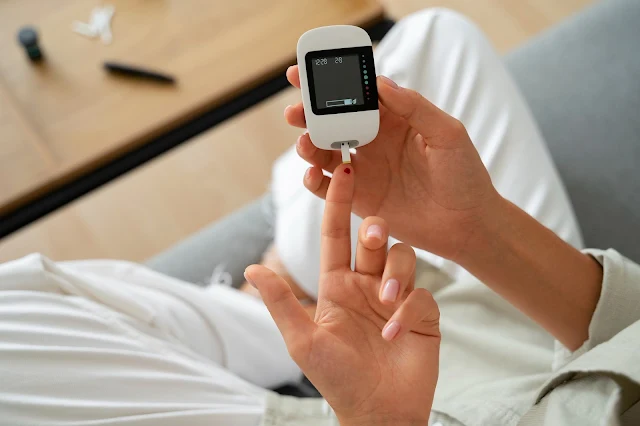Diabetes is a chronic condition that affects millions of people worldwide. Understanding the basics of diabetes, including its causes, symptoms, treatment options, and different types, is crucial for managing this condition effectively. This comprehensive guide aims to demystify diabetes and provide valuable insights into its various aspects.
What Is Diabetes?:
- Diabetes is a metabolic disorder characterized by high blood sugar levels (hyperglycemia) resulting from inadequate insulin production, ineffective insulin utilization, or both.
- Insulin, a hormone produced by the pancreas, regulates blood sugar levels by facilitating glucose uptake into cells for energy or storage.
Causes of Diabetes:
- Type 1 Diabetes: Caused by autoimmune destruction of insulin-producing beta cells in the pancreas, leading to little or no insulin production.
- Type 2 Diabetes: This develops due to insulin resistance, where cells become less responsive to insulin, coupled with reduced insulin secretion over time.
- Other Causes: Gestational diabetes during pregnancy, genetic factors, obesity, a sedentary lifestyle, and certain medical conditions can contribute to diabetes development.
Common Symptoms:
- Frequent urination (polyuria)
- Increased thirst (polydipsia)
- Unexplained weight loss
- Fatigue and weakness
- Blurred vision
- Slow wound healing
- Recurrent infections, especially urinary tract infections (UTIs)
Diagnosis and Screening:
- Blood Glucose Testing: Fasting blood sugar (FBS), oral glucose tolerance test (OGTT), and random blood sugar (RBS) tests are used to diagnose diabetes and monitor blood sugar levels.
- Hemoglobin A1c (HbA1c) Test: Measures average blood glucose levels over the past 2-3 months, providing a long-term indicator of blood sugar control.
Treatment Approaches:
- Lifestyle Modifications: Healthy diet, regular physical activity, weight management, and smoking cessation play key roles in diabetes management.
- Medications: Insulin therapy, oral antidiabetic drugs (e.g., metformin, sulfonylureas, etc.), and other medications may be prescribed based on diabetes type and individual needs.
- Monitoring and Self-Care: Regular blood sugar monitoring, medication adherence, foot care, eye exams, and self-management education are essential components of diabetes care.
Types of Diabetes:
- Type 1 Diabetes: Typically diagnosed in childhood or adolescence, characterized by autoimmune destruction of beta cells, requiring lifelong insulin therapy.
- Type 2 Diabetes: Most common form, often linked to lifestyle factors like obesity and physical inactivity, managed with diet, exercise, medications, and sometimes insulin.
- Gestational Diabetes: Occurs during pregnancy and usually resolves after childbirth, but increases the risk of type 2 diabetes later in life.
- Prediabetes: A precursor stage with higher-than-normal blood sugar levels, indicating increased risk of developing type 2 diabetes without intervention.
- Other Types: Monogenic diabetes (e.g., MODY), secondary diabetes (due to other medical conditions or medications), and gestational diabetes mellitus (GDM) are other variants.
Complications and Risk Factors:
- Chronic complications: Cardiovascular disease, neuropathy (nerve damage), nephropathy (kidney disease), retinopathy (eye damage), and foot complications.
- Risk Factors: Family history of diabetes, obesity, sedentary lifestyle, poor diet, age, ethnicity, gestational diabetes, and certain medical conditions increase diabetes risk.
Prevention and Management Strategies:
- Healthy Lifestyle: Balanced diet, regular physical activity, weight management, stress reduction, and smoking cessation reduce diabetes risk and improve overall health.
- Regular Monitoring: Blood sugar monitoring, HbA1c tests, blood pressure checks, cholesterol screenings, and eye exams are crucial for early detection and management.
- Diabetes Education: Understanding diabetes, self-care practices, medication management, and lifestyle modifications empower individuals to manage their condition effectively.
Advancements in Diabetes Care:
- Continuous Glucose Monitoring (CGM) systems: Real-time monitoring of blood sugar levels, providing valuable insights for diabetes management.
- Insulin Delivery Systems: Insulin pumps, pens, and inhalers offer convenient and precise insulin delivery options, improving treatment adherence and control.
- Personalized Medicine: Tailored treatment plans based on individual needs, genetic factors, lifestyle, and medical history optimize diabetes management and outcomes.
Support and Resources:
- Diabetes Support Groups: Online and offline support groups, community organizations, and educational programs offer peer support, information, and resources for individuals living with diabetes.
- Healthcare Professionals: Endocrinologists, diabetes educators, nutritionists, and other healthcare providers play crucial roles in diabetes care, education, and management.
- Technology and Apps: Mobile apps, digital platforms, and telemedicine services provide tools for tracking, monitoring, and managing diabetes on-the-go.
Conclusion: Diabetes is a complex but manageable condition that requires a comprehensive approach involving lifestyle modifications, medication management, regular monitoring, and education. By understanding the causes, symptoms, treatment options, and types of diabetes, individuals can take proactive steps to prevent, manage, and thrive with this chronic condition. Access to support, resources, and advancements in diabetes care empowers individuals to lead healthy, fulfilling lives while effectively managing their diabetes.

Comments
Post a Comment